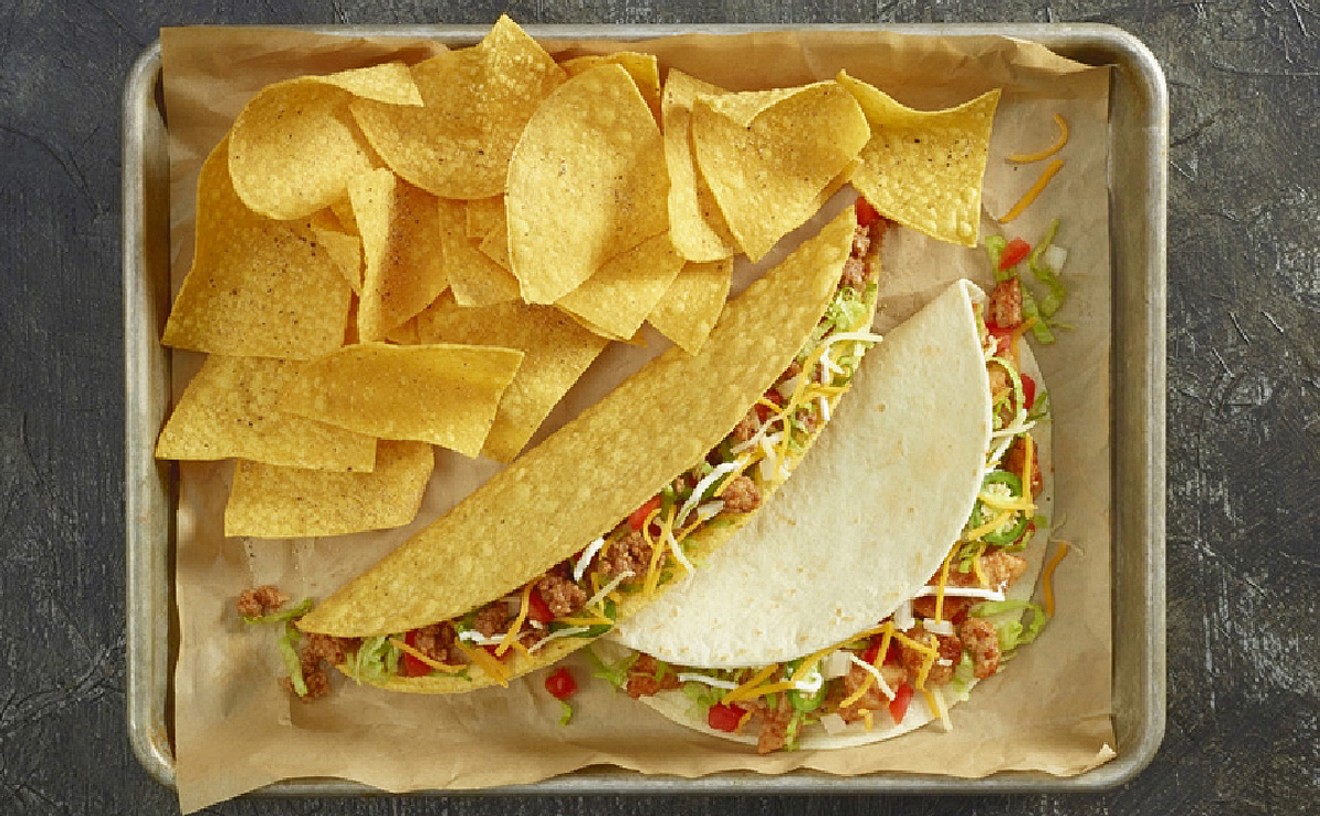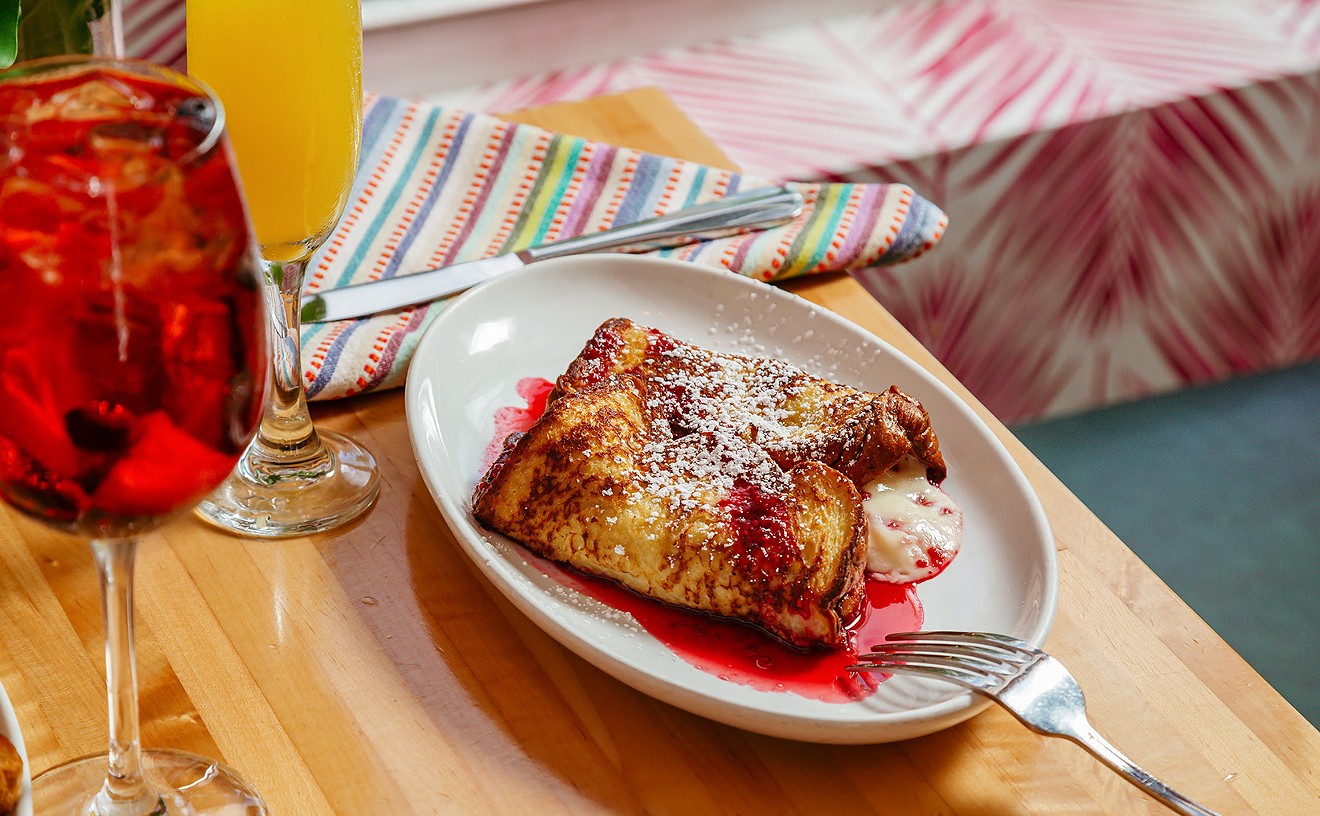There's a never-ending procession of ducks at King Palace Chinese Bar-B-Q. A row of cooked, shiny auburn birds welcomes you to the squat mustard-yellow building on NE 167th Street. Take a seat at one of the lazy-Susan-topped tables and choose a quarter ($9), half ($13), or whole bird ($23). Soon, a gentle hiss emerges from the kitchen as ripping-hot oil provides a final crisping. Then comes a dull thwacking as the duck is cleaved into parts. Finally, it's laid on a bed of rice adorned with deep-green bits of pak choi.
One bite is enough for the addiction to take hold. There's the crunch of that taut skin and a rush of juice. Close your eyes. Savor the moment. You're hooked.
The ritual begins around 10 a.m. daily with some of the 200 or so ducks the place sells each week.
tweet this
Since 2001, the Wu family has dished out countless avian dependencies. They abandoned poverty-stricken Guangzhou, China, in 1982 for Caracas, Venezuela. There, they opened a Chinese restaurant and found success turning out
Once here, they fanned out across the city, folding dumplings and flipping woks. By 2001, they had saved enough money to purchase King Palace. Today 42-year-old Mei Wu manages the floor while her 48-year-old brother, Chris, oversees the kitchen. Chris had never roasted a duck until his family bought the restaurant. At the time, the previous chef agreed to stay long enough to pass on his technique, which Chris dutifully repeats every day.
The ritual begins around 10 a.m., when Chris removes the entrails from about two dozen of the 200 or so ducks the restaurant sells each week. Then leg and wing tips are chopped away. The bird's cavity is stuffed with crushed garlic and ginger, followed by a pungent blend of oyster, soy, and hoisin sauces laced with star anise.
With the bird seasoned, Wu moves on to the most important part. From a hidden corner of his kitchen, he pulls out a long, glinting needle attached to a butcher cord. He pinches shut the skin around the bird's opening, pierces it, and threads it until the cavity is sealed. The growl of an air compressor adds to the cacophony of hissing woks.
Wu grabs another needle, this one attached to the compressor, and slips it under the bird's skin. Soon it swells and bulges like a balloon. "This is how the skin gets so crispy," Mei says, translating for her brother.
Here's how it works: Pressurized air pumped between the skin and meat effectively separates the two. Then the birds are hung to dry for at least 12 hours. They're ready once the skin has tightened and its pink shine has dulled. These two steps help the thick layers of fat render during roasting, basting the meat while developing the skin's tantalizing crunch. Finally, Wu hangs about a dozen ducks at a time inside a tall, narrow oven. After 45 minutes, they're ready.
The Chinese have been roasting ducks in this fashion for nearly 2,000 years. For centuries, they were a staple at royal banquets, but as time passed, the birds fluttered down to the rest of Chinese society. Beijing's Bianyifang, perhaps the longest-running restaurant to serve the birds, is believed to have opened during the Ming Dynasty in 1416. By the 18th Century, ducks began to waddle onto plates across China. Today, restaurants and butchers with rows of roast ducks hanging in their windows are the surest signs of a city's Chinatown.
It's important to note the dish primarily comes in two forms. There's the simpler roast duck, the kind King Palace serves. It offers the bird bone-in, chopped up, and often with some kind of rice and vegetable. The fancier Peking duck is sometimes dunked into a sugar solution to catalyze the crisping, but the main difference is the presentation. It's served with flour crepes and meant to be rolled up with hoisin, along with a few shreds of scallion.
"Peking duck should be served with the head on," Tropical Chinese owner Mei Yu says. "Then it should be sliced, without the bones, right in front of you to show how crispy the skin is and how nice and juicy the meat is." The thought is that roasting the duck without its head to please skittish diners leads to the loss of natural juices.
Tableside preparation at Tropical is a kind of satisfaction guarantee to show the kitchen isn't taking any unsavory shortcuts. These ducks are accompanied by paper-thin flour crepes, scallions, and a smear of sweet hoisin rather than rice. Tropical even rolls your pancakes for you and throws crunchy cucumber spears in with the duck ($65) for a bit of brightness.
There's less pomp at King Palace, but that doesn't mean it's any less worthy — simply less expensive. Roast duck is the blue-collar, everyday version of Peking duck, and it's similarly habit-forming. This is the bird you grab between meetings to savor in the car. Or you pick one up after work to become a hero to a hungry group at home.
No matter the price tag and setting, it's the process that's most important. Demand to know your duck has been prepared in a style two millennia in the making. That's how it's done at King Palace. All that's left is to figure out when to get one. "Come around 11:30 a.m.," Mei Wu says. "That's when we're pulling them out of the oven and they're at their best."
King Palace Chinese Bar-B-Q
330 NE 167th St., Miami; 305-949-2339. Daily 11 a.m. to 10 p.m.
Tropical Chinese
7991 Bird Rd., Miami; 305-262-7576; tropicalchinesemiami.com. Monday through Thursday 3:30 to 10:30 p.m., Friday and Saturday 3:30 to 11 p.m., Sunday 3:30 to 10 p.m. Dim sum Monday through Thursday 11:30 a.m. to 3:30 p.m., Friday and Saturday 11 a.m. to 3 p.m., Sunday 10:30 a.m. to 3:30 p.m.










